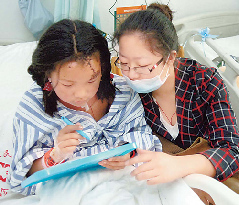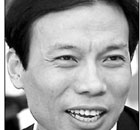Rescue & Aid
Grassroots charities, volunteers help the helpers
By Hu Yongqi (China Daily)
Updated: 2010-04-30 07:01
 |
Large Medium Small |
Although their resources may be limited, "grassroots charitable organizations are very efficient when it comes to providing support, both physical and emotional," said Li Zhongbiao, a 24-year-old volunteer from Hunan province with the Chinese Association of Life Care, a nonprofit group.
On April 15, one day after the Yushu earthquake, Li posted an online appeal for volunteers to join him in providing medical care for the survivors. Three days later, he arrived in the disaster zone with a team of 11 volunteers.
The group was specially selected from 200 applicants according to their medical qualifications and experience, said Li, who only organized the group and is not a medic. "We soon became friends and helped the survivors together," he said. "We are not here because of a mandate; we are here voluntarily, which makes us more efficient and produces better results."
|
 |
|
A Tibetan girl practices her writing while she receives treatment in a hospital in Chengdu, capital of Sichuan province. The girl was rescued from a collapsed house in Yushu, epicenter of the 7.1-magnitude earthquake. YU PING/FOR CHINA DAILY
|
One of those waiting for treatment was 12-year-old Kunga Phuntsok, who has been receiving treatment for a lung infection. "I am grateful for their help," he said.
People from across the country have donated the medicine for survivors but it often takes days for it to be transported into the disaster zone. However, the quantity and variety of the drugs is far from enough, said Li, whose team also lacks necessary advanced medical equipment to perform surgery.
"We don't have an ambulance, either, so when we encounter an emergency situation we can only call the official emergency hotline. Even then there is no ambulance usually available," he said. "Grassroots organizations and individual volunteers need to cooperate with official organizations. At the moment, there is very little communication and cooperation."
When doctor Chen Zefen, 35, arrived in Yushu to join the Chinese Association of Life Care team, she said she could not get in touch with the relevant government departments or find transportation to take her to the Gyegu resettlement camp, which is 4,000 meters up in the mountains.
"I had to walk nearly 10 km to get to the settlement," she said.
Contributing kindness
There is no official figure for the number of volunteers currently in Yushu but Li said dozens of grassroots organizations have contacted him about the ongoing relief operation. "Most of them also went to Sichuan after the earthquake in 2008," he said.
|
||||
Grassroots charitable organizations also provide vital medical and psychological support to victims, the report added.
However, volunteer groups continue to face serious challenges in disaster zones such as Yushu, chiefly from a lack of resources and, sometimes, professional experience, said the Sun Yat-sen University research.
Although the government approves the efforts of volunteers, experts have urged authorities to launch further regulations and supportive policies for charities.
Peng Yining contributed to this story.
(China Daily 04/30/2010 page7)







